A harmless housewarming addition to your living room or a dangerous decoration?
Cat owners often wonder if the plants in their house are safe for their pets—especially with their cats prowling around every which way.
Whether they are accidentally ingested or touched by their pets—can it be harmful?
The last thing cat owners want is to provide an unsafe environment for their feline friends. One plant in particular that gets questioned a lot prior to taking the leap and buying one – is the Orchid.
Let‘s discuss the dangers of this plant and ways we can prevent our cats from eating or coming into contact with these and other plants in our homes.
Contents
Are Orchids Poisonous for Cats?
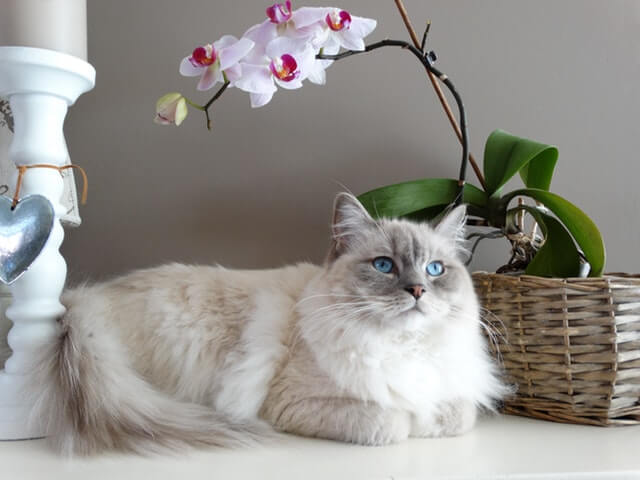
While there are some houseplants out there you should avoid having in your home; Orchids are not one of them.
Orchids are part of the Orchidaceae family and are perfectly safe for your cat to be around. While there are many different varieties of orchids out there, none have yet to be reported as being toxic for your cat, either by contact or ingestion of the plant itself—which is great news, because Orchids are gorgeous!
The unfortunate thing about these beautiful plants is that most orchids need fertilisers to help them grow and stay healthy.
Fertilisers can be toxic if your cat ingests or comes into contact with them. This explains a lot of the misunderstanding, perhaps, in the insinuation that Orchids are dangerous. It‘s not the actual flower, but what lies underneath.
To eliminate this risk, try finding an Orchid where fertiliser isn‘t necessary or try applying it only to the plant’s roots and not the leaves itself. One way and perhaps the best way to keep your cat safe from fertiliser poisoning is to use natural or organic alternatives that will be harmless to your cat.
Also Read: Are Lilies Poisonous To Cats?
List of Safe Varieties of Orchid
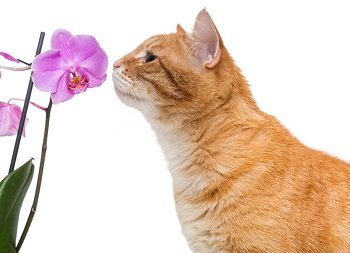
As previously stated, all varieties of orchids are safe to have in your home.
Phalaenopsis Orchid, also known as Moth Orchid or Moon Orchid, is probably the most common and regularly sold orchid in stores (see below).
- Delivery from 01-01 until 31-12
- Ideal houseplant
- Makes a nice Gift
- Delivered as Pot plant
Other safe, popular varieties out there include:
- Cattleya orchids
- Vanda orchids
- Paphiopedilum orchids
- Miltonia orchids
- Oncidium orchids
- Dendrobium orchids
- Phragmipedium orchids
- Cymbidium orchids
- Odontoglossum orchids
How do I Discourage My Cat from Going Near My Orchids?
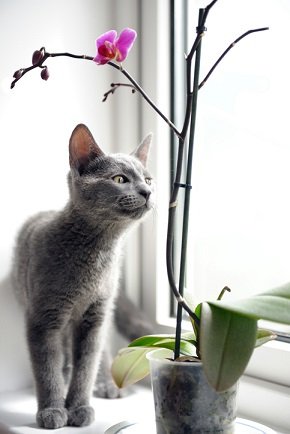
Keeping your cat away from your plants, in general, is ideal mainly because you want to keep your cat in good health as a responsible cat-mom or dad.
The following suggestions can be used in relation to all houseplants and not just specific to orchids.
Try having a designated area in your house where you keep all your plants such as a garden room or sunroom. It should have a door that can be closed and of course, receive plenty of adequate sunlight throughout the day.
If a separate room isn‘t an option, try placing several plants together on a shelf or perhaps by a window that isn‘t big enough for your cat to linger around. (Don‘t underestimate your cat‘s climbing potential!)
Make sure your plants are potted in the appropriate size pot – that way there should be no extra room for your cat to dig or climb into it.
Hanging your plants is a simple way to keep them out of reach from your cat—except for the highly ambitious jumpers!
Place rocks or seashells on top of the soil around your plants to deter your cat from getting into the soil.
To keep cats from munching on leaves or flowers try dusting them with cinnamon, cayenne pepper, or bitter apple—unless your cat has a strange palate, they‘ll steer clear away!
A diluted mixture of vinegar and water to spray on plants is also a good deterrent to keep your cat from chewing on the leaves or flowers, alternatively, you can buy purpose-made cat deterrents which are very effective.
What Should I do if I Suspect Fertiliser Poisoning in my Cat?
Fertiliser poisoning can be mild to moderately harmful in cats.
How harmful depends on a combination of factors: the amount of fertiliser consumed by the cat and the concentration of fertiliser being used in the solution.
Some signs to watch for if you think your cat has possibly ingested or come into contact with a fertiliser are drooling, nausea, vomiting, diarrhoea, abdominal pain, and difficulty breathing.
Generally, these symptoms will appear ten to fifteen minutes after consumption. If you believe your cat has been exposed to fertiliser, you should call or take your cat directly to your local vet‘s office or call the Animal Poison Line for recommendations on what to do. Bring the fertiliser with you to help the vet properly diagnose and treat your cat as quickly as possible.
Safe Houseplant Options
Since we have already established that orchids are safe to have in your home, I’ve provided you with a more extensive list of other houseplants and flowers that you can lavishly plant around your home which are also non-toxic to your cat.
Flowers that are considered safe:
- Rose
- Sunflower
- Zinna
- Snapdragon
- Gerber Daisy
- Cosmos
- Celosia
- Hollyhock
- Bee Balm
- Aster
- Cornflower
- Echinacea
- Astilbe
- Marigold
- Nasturtium
- Coreopsis
- Torch Lily
- Jasmine
Plants that are considered safe:
- African Violet
- Air Plantn
- Aluminum Plant or Watermelon Plant
- Christmas Cactus
- Boston Fern and Maidenhair Fern
- Friendship Plant
- Basil, Sage, and Thyme Herb Plants
- Lace Flower Vine or Chocolate Soldier
- Lipstick Plant
- Parlor Palm
- Polka Dot Plant
- Prayer Plant or Calathea
- Spider Plant
- Hens and Chicks, Echeveria, and Rosettes Succulents
If you ever find yourself questioning if a certain household varietal is toxic to your pet, check out the RSPCA Toxic and Non-toxic plant list to get clarification.
You can now rest easy knowing that having orchids in your house will not harm your feline housemates—the most harmful thing they can do is make guests jealous.
The one thing to keep an eye out for when it comes to orchids, however, is if it is necessary to use fertilisers. When fertiliser is used, it is important to keep your cat away from the plant—or at least the fertiliser.
If your cat does come in contact with the fertiliser, be sure to seek a veterinarian‘s help as quickly as possible. If you want to avoid this problem altogether, there are plenty of other safe houseplants on the market that don`t require the use of fertilisers and look just as beautiful around the house. Check out all your options and choose what is best for you and your cat.
As an Amazon Associate I may earn a small fee from qualifying purchases at no extra cost to you. This helps us run the site, so thanks for your support!


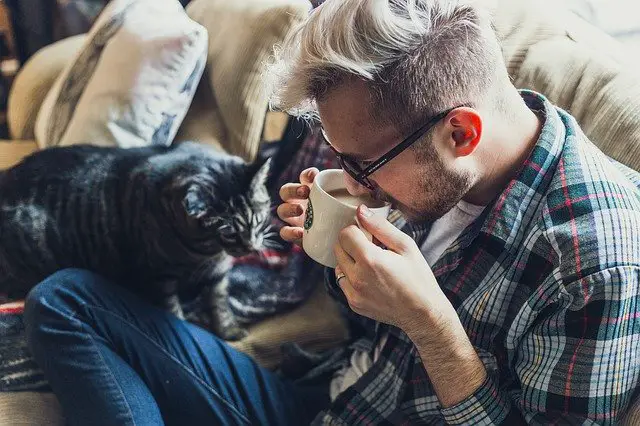
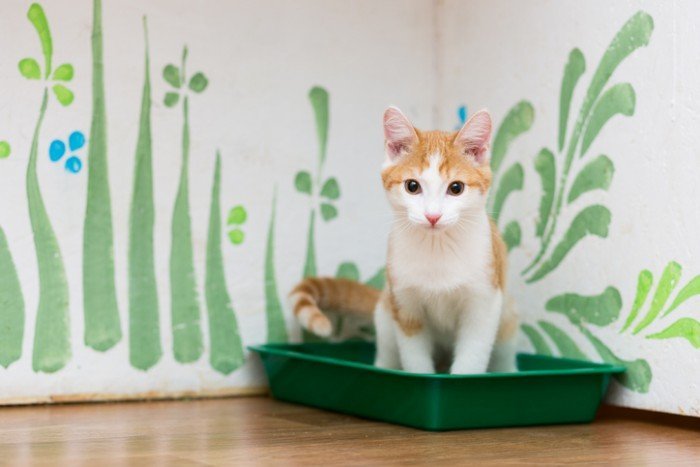
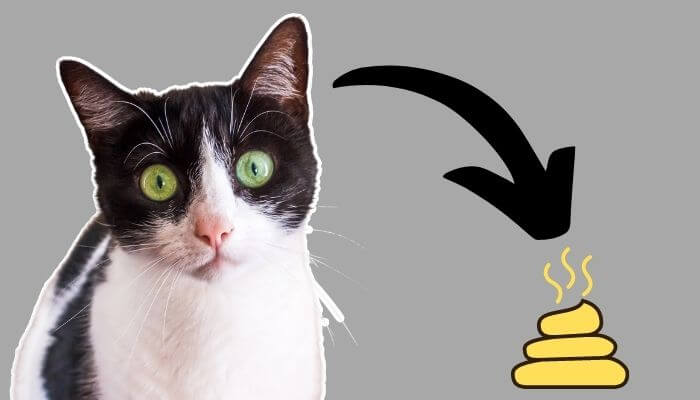
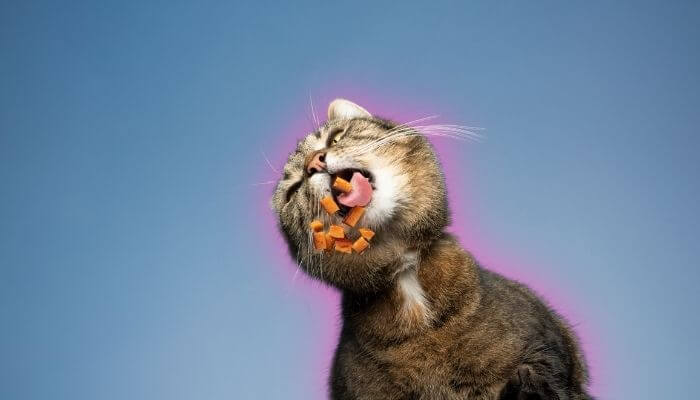
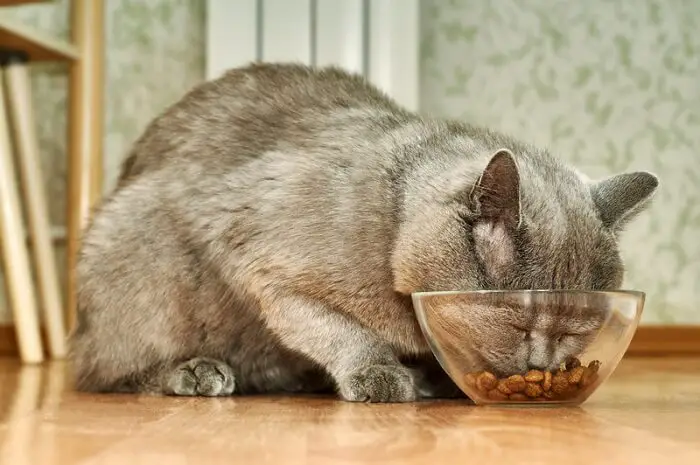

Leave a Comment